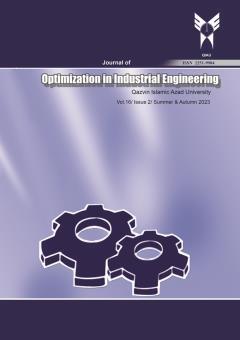Enhancing Ethic Integrity and Human Resource Development to Build a Green Banking Business Model in Indonesia
الموضوعات :
Sobar M. Johari
1
![]() ,
Wing Keung Wong
2
,
Jenho Peter Ou
3
,
Wing Keung Wong
2
,
Jenho Peter Ou
3
1 - Department of Sharia Economics, Universitas Muhammadiyah Yogyakarta (UMY), Indonesia.
2 - Department of Finance, Fintech & Blockchain Research Center, and Big Data Research Center, Asia University, Taichung 41354, Taiwan
3 - Department of Finance, Asia University, Taiwan
الکلمات المفتاحية: Fairness, Equity, Honesty, Integrity, Fuzzy Method, DEMATEL analysis,
ملخص المقالة :
In recent years, researchers and intellectuals have paid close attention to Sustainable Banking. Such interest has sparked several debates on the matter, resulting in a significant amount of study in Sustainable Banking throughout the years. An empirical study on Sustainable Banking and profitability for sustainable development has yielded varied outcomes. This study contributes to developing and improving Sustainable Banking by integrating social, resource, and ethical integrity factors of sustainability. This study uses fuzzy logic and the DEMATEL model to identify and evaluate the interdependence of two factors, ethical integrity, and sustainable human resource development. The results of the study indicate that the critical ethical factors are "fairness and equity covering the customer treatment, honesty and integrity, corporate governance" in the banking industry in Indonesia ethic integrity and HRD. Despite the importance of this topic, there has been a lack of empirical evidence until recently. In this paper, we take stock of the empirical evidence in the literature through a banking managerial lens.
Abad, J., D’Errico, M., Killeen, N., Luz, V., Peltonen, T., Portes, R., & Urbano, T. (2022). Mapping exposures of EU banks to the global shadow banking system. Journal of Banking & Finance, 134, 106168.
Biswas, M. N. (2011). Sustainable Sustainable Banking Approach: The Need of the Hour.
Cahen-Fourot, L., & Lavoie, M. (2016). Ecological monetary economics: A post-Keynesian critique. Ecological Economics, 126, 163–168. https://doi.org/10.1016/j.ecolecon.2016.03.007
Chaudry, A. S., Azmat, S., & Sohail, M. (2018). State contingent and conventional banking: The optimal banking choice model. Economic Modelling. https://doi.org/10.1016/j.econmod.2017.07.008
Abad, J., et al. (2022). Mapping exposures of EU banks to the global shadow banking system. Journal of Banking & Finance, 134, 106168.
Chen, J., et al. (2022). The Effect of Sustainable Banking Practices on Banks’ Environmental Performance and Green Financing: An Empirical Study. Energies, 15(4), 1292.
Tseng, M.-L., et al. (2020). Sustainable packaged food and beverage consumption transition in Indonesia: Persuasive communication to affect consumer behavior. Resources, Conservation and Recycling, 161, 104933.
Úbeda, F., et al. (2022). Do formal and informal institutions shape the influence of sustainable banking on financial development? Finance Research Letters, 46, 102391.
Dialysa, F. (2015). Sustainable Banking: One Effort To Achieve The Principle of GCG. First International Conference on Economics and Banking. Doś, A. (2018
Dosi, G. (1982). Technological paradigms and technological trajectories: A suggested interpretation of the determinants and directions of technical change. Research Policy, 11(3), 147–162. https://doi.org/10.1016/0048-7333(82)90016-6.
Falcone, P. M., Morone, P., & Sica, E. (2018). Greening of the financial system and fuelling a sustainability transition: A discursive approach to assess landscape pressures on the Italian financial system. Technological Forecasting and Social Change. https://doi.org/10.1016/j.techfore.2017.05.020
Fang, Y., Hasan, I., & Marton, K. (2014). Institutional development and bank stability: Evidence from transition countries. Journal of Banking and Finance. https://doi.org/10.1016/j.jbankfin.2013.11.003
Ferreira, F. A. F., Jalali, M. S., & Ferreira, J. J. M. (2016). Experience-focused thinking and cognitive mapping in ethical banking practices: From practical intuition to theory. Journal of Business Research. https://doi.org/10.1016/j.jbusres.2016.04.058
Fu, X. (Maggie), Lin, Y. (Rebecca), & Molyneux, P. (2014). Bank competition and financial stability in Asia Pacific. Journal of Banking and Finance. https://doi.org/10.1016/j.jbankfin.2013.09.012
Hamilton, J. T. (1995). Testing For Environmental Racism: Prejudice, Profits, Political Power?
Journal of Policy Analysis and Management, 14, 107–132.
Johari, M. (2014). Analisis Financial Crunch Pada Industri Perbankan Syariah Saat Krisis Keuangan Global 2008. Afkaruna: Indonesian Interdisciplinary Journal of Islamic Studies, 10(1), 59-67. doi:https://doi.org/10.18196/aiijis.2014.0031.59-67
Liang, L. W., Chang, H. Y., & Shao, H. L. (2018). Does sustainability make banks more cost efficient? Global Finance Journal. https://doi.org/10.1016/j.gfj.2018.04.005
Manlagnit, M. C. V. (2015). Basel regulations and banks’ efficiency: The case of the Philippines. Journal of Asian Economics. https://doi.org/10.1016/j.asieco.2015.06.001
Uddin, M. N., & Ahmmed, M. (2018). Islamic Banking and Sustainable Banking for Sustainable Development: Evidence from Bangladesh. Al-Iqtishad: Jurnal Ilmu Ekonomi Syariah.
Rajput, N., Arora, M. S., & Khanna, M. A. (2013). An Empirical Study of Impact of Environmental Performance on Financial Performance in Indian Banking Sector. International Journal of Business and Management Invention, 2(9), 19–24.
Rosdwianti, M. K., & Dzulkirom AR, M. (2016).Pengaruh Corporate Social Responsibility (CSR) Terhadap Profitabilitas Perusahaan.Jurnal Administrasi Bisnis S1 Universitas Brawijaya, 38(2), 16–22.
Sobhani, F. A., Amran, A., & Zainuddin, Y. (2012). Sustainability disclosure in annual reports and websites: A study of the banking industry in Bangladesh. Journal of Cleaner Production. https://doi.org/10.1016/j.jclepro.2011.09.023
Stankeviciene, J., & Nikonorova, M. (2014). Sustainable Value Creation in Commercial Banks During Financial Crisis. Procedia - Social and Behavioral Sciences. https://doi.org/10.1016/j.sbspro.2013.12.966
Tseng, M. L. (2017). Using social media and qualitative and quantitative information scales to benchmark corporate sustainability. Journal of Cleaner Production. https://doi.org/10.1016/j.jclepro.2016.05.062
Uwuigbe, U., Uwuigbe, O. R., Teddy, O., & Emmanuel, O. (2018). Sustainability Reporting and Firm Performance: A Bi-Directional Approach. Academy of Strategic Management Journal, 17, 1–16.
Yip, A. W. H., & Bocken, N. M. P. (2018). Sustainable business model archetypes for the banking industry. Journal of Cleaner Production. https://doi.org/10.1016/j.jclepro.2017.10.190
Weber, O. (2016). The Impact of Sustainable Banking Guidelines on the Sustainability Performance of Banks. Cigi, (79), 8.


